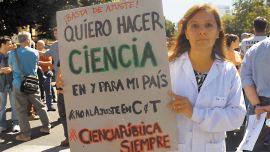Protesters took to the streets in Buenos Aires on Monday evening to demand justice for a deadly attack last week on four lesbians that killed three and left one fighting for her life.
Carrying placards and banners, around a hundred people gathered at Plaza Colombia to march to the boarding house where the lethal arson attack took place last Monday (May 6).
Denouncing what they described as a “lesbicide,” demonstrators called on President Javier Milei’s government to do more to tackle homophobic violence and accused the national administration of fomenting discriminatory discourse.
The horrific attack took place in Barracas last Sunday evening when a man threw a Molotov cocktail into a room shared by two lesbian couples at a boarding house in Buenos Aires.
Pamela Cobas, 52, and Roxana Figueroa, 52, passed away on Tuesday and Wednesday as a result of complications from severe burns.
Andrea Amarante, 42, who was hospitalised after the attack with 75 percent of her body burnt, passed away on Sunday night.
The fourth woman, 49-year-old Sofía Castro Riglos, who suffered milder injuries, "is recovering and has a good prognosis," said María Rachid, a member of the Federación Argentina LGBT+.
The attack Monday, widely seen as a hate crime, shocked many in a nation that previously considered itself to be a pioneer of gay rights in Latin America.
The Federación Argentina LGBT+ has described the attack as “one of the most abhorrent hate crimes of recent years.”
In a statement posted on social media condemning the “hate crime,” the Ni Una Menos anti-gender violence collective pointed the finger at the government for its promotion of “hate speech,” declaring “the state is responsible.”
The perpetrator has been identified by local media as 62-year-old Justo Fernando Barrientos. Eyewitnesses and other lodgers at the boarding house where the attack took place say he had abused and threatened the victims on previous occasions.
Cobas and Figueroa were a couple and lived together in a shared room with Amarante and Castro Riglos.
The attack took place at a boarding house located at Olavarría 1621 in Barracas.
The damage from the attack was not limited to the four victims: a total of 30 people were evacuated from the boarding house, of which seven were hospitalised for burns sustained in the incident.
Accused
Barrientos has not yet been questioned and Judge Edmundo Rabbione, who is leading the case, will have to determine whether or not the prisoner is fit to be charged and stand trial.
Judge Rabbione is yet to decide if aggravating factors will be added to potential charges and will have to rule if the attack was motivated by hatred of gender, sexual orientation or identity.
Reporting by Pagina/12 published this week, citing people who lived at the boarding house, said that the suspect regularly insulted the four women and threatened to kill Cobbas and Figueroa.
The newspaper also said that when the fire broke out, Barrientos fought with the victims and sought to prevent them escaping. Suffering from extreme burns, they eventually managed to break free and get to a shared bathroom.
“He had already threatened them once. It was last Christmas. He told them he was going to kill them both [Pamela and Mercedes] and look what happened now,’ said Diego Hernán Britez, a 51-year-old street vendor who lived on the boarding house’s first floor.
Britez said that he had heard several quarrels between the suspect and the victims during the two years they had lived at the property. Barrientos was openly homophobic, he added, and had abused others who were gay.
“They argued a lot. They called the police once and I understand that they had denounced him,” Britez told the Presentes news agency.
Vigil, demand for justice
Dozens of people gathered last week in front of the boarding house, lighting candles for a vigil. Last Friday, another event was held near the National Congress building to demand justice for the attack.
Argentina has been a Latin American leader in gay marriage and identity legislation, with a 2021 law allowing non-binary people to mark their gender with an "X."
However, many fear a backsliding in their freedoms under President Milei. Critics have accused the government of promoting hate speech online and fostering a culture of intolerance.
Upon taking office last December, the President scrapped the National Women, Gender & Diversity Ministry, downgrading it to a Secretariat. As well as defunding the INADI anti-discrimination agency, Milei has also banned the use of gender-inclusive language in the military.
During a speech to global leaders at the World Economic Forum in Davos, Switzerland in January, the President took aim at socialism, "radical feminism" and the "bloody agenda of abortion."
Feminism is a “ridiculous and unnatural fight between men and women,” argued Milei, who claimed the movement only serves to ‘give jobs to bureaucrats.”
The attack was classified as a “hate crime” by the Women & Diversity Ministry of Buenos Aires Province, which is governed by opposition leader Axel Kicillof.
"This hate crime is not an isolated incident and is part of the discourse that is irresponsibly repeated by the national government," wrote the portfolio in a post on the X social network.
‘Discrimination is allowed’
As she lit a candle outside the boarding house in Barracas where the tragedy took place last week, Valeria Bettini, 50, also placed the blame at the government’s door.
“Since the new government took office, all we hear are messages of hatred towards the homosexual community,” said the 50-year-old. “Discrimination is allowed.”
“I'm here because I'm even afraid to go out with my [rainbow] bracelet. I've never felt this before,’ agreed Roxana Rega, a 48-year-old artisan collective maker, as she displayed jewellery using imagery associated with the LGBT+ community.
Speaking prior to this Monday’s protest, Presidential Spokesperson Manuel Adorni said that he preferred not to see the attack as targeted against “a certain group.”
Asked about the episode by reporters, Adorni said that "it is unfair to talk only about this episode when violence is more widespread."
"I don't like to define it as an attack against a certain group, a collective, it is wrong, it is terrible, repudiatory, whoever it is against," he said.
"That someone would throw a Molotov bomb, in this case against these four people … is repudiatory," said the official continued.
"It is very unfair to only talk about this episode when violence is more comprehensive than simply an issue against a certain group and there are many women and men who suffer from it and it cannot continue to happen," he concluded.
Left-wing deputy Romina Del Plá condemned those remarks.
“We speak of lesbicide because it is a hate crime against the LGBT community,” wrote the lawmaker, who said the attack had been “aggravated by the adjustment and cuts in the gender budget that worsens living conditions.”
Victims
Andrea Amarante, 42, is the youngest of the fatalities. She was a former survivor of the fatal fire at the República Cromañón nightclub in Once, Buenos Aires, on December 30, 2004, a tragedy in which 194 people died. A former medical worker suffered burns to 75 percent of her body during the attack.
Pamela Cobbas was 52 years old and a native of Mar del Plata. She died in the hours following the attack due to the seriousness of her injuries, which included severe burns. According to her fellow occupants of the boarding house, she was a candy and cosmetics saleswoman. A mother of two (ages 27 and 14), she was openly gay and posted in favour of the LGBT+ community on her social media accounts.
Mercedes Roxana Figueroa, also 52 and Pamela's partner, died on Wednesday. Boarding house residents said the woman worked odd-jobs, including as a salesperson and as a cleaner of clothes.
Sofia Castro Riglos, 50, is the only survivor and reportedly has a favourable prognosis. Originally from Neuquén, she is “responding well to treatment,” according to a statement issued by the Hospital del Quemado, where she remains hospitalised.
Perpetrator
Justo Fernando Barrientos, 67, has lived in the boarding house for several years. Arrested at the scene, he spent the initial days after the attack at the Hospital Argerich receiving treatment. He was discharged three days later and taken into custody. A former restaurant worker, local residents said he moved to the boarding house as a result of gambling problems.
by – TIMES/PERFIL/AFP/NA


























Comments